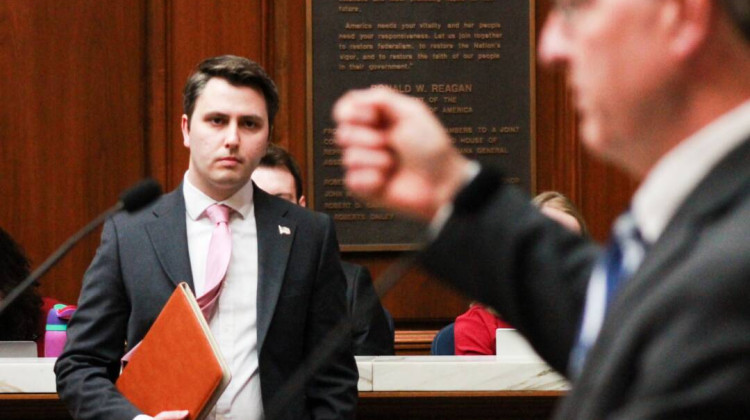
Grouseland was William Henry Harrison's home when he was governor of the Indiana Territory in the early 19th century.
Nyttend/CC-0VINCENNES, Ind. (AP) — The one-time Indiana home of the nation’s ninth president is getting a $1.2 million restoration that will include sprucing up the more than 200-year-old mansion’s main floor with new windows and porches.
Workers with Columbus, Ohio-based Durable Restoration Company recently started working on Grouseland, the Vincennes residence that was William Henry Harrison's home when he was governor of the Indiana Territory in the early 19th century. Harrison was elected U.S. president in 1840.
The restoration will focus on the two-story brick home's first floor, specifically its study and dining room, and include adding exact replicas of the home's original wood windows, repairing its first-floor fireplaces and adding new, period-appropriate wallpaper.
A makeshift plastic tunnel has been installed to hold down dust inside the rest of the mansion, which remains open for tours by appointment, said Lisa Ice-Jones, executive director of the Grouseland Foundation, which looks after the historic home.
The mansion was completed in 1804 and is located about 50 miles north of Evansville on a plot of land a short distance from the Wabash River.
The current restoration project represents about half of the work the foundation plans for the building. Workers will also reveal some original wood floors in the dining room, repair some exterior masonry and rebuild the home’s front and side porches.
“Everything in this house will be real. The history that happened here is real. And I’m so excited for people to come back and see it once its completed," Ice-Jones told the Vincennes Sun-Commercial.
Durable Restoration expects the first phase of the restoration project to take at least six months, likely wrapping up sometime in June.
The Grouseland Foundation’s board of directors hired Mesick Cohen Wilson and Baker in 2014 to assess the mansion and its restoration needs. The Albany, New York-based architectural firm recommended a $3.5 million restoration, but the foundation opted to handle that work in phases.
After the foundation received a $400,000 grant from the Thomas Jefferson Foundation, Ice-Jones led a successful effort that raised the remaining $800,000 needed for the first phase.
Grouseland officials also led a successful push for Knox County’s innkeepers’ tax to be increased by 1% to help fund the various phases of restoration, although Ice-Jones said the coronavirus pandemic has stifled revenue for now.
 DONATE
DONATE






 Support WFYI. We can't do it without you.
Support WFYI. We can't do it without you.